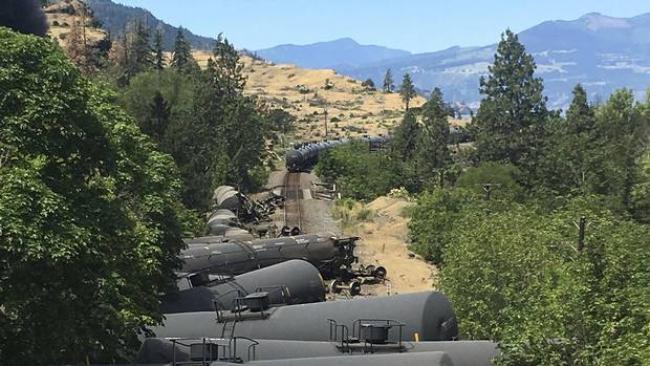Articles Menu

Two companies proposing to build what would be U.S. largest oil-by-rail marine terminal along the Columbia River in Washington see it as an opportunity to link domestic crude oil from the Midwest to a West Coast port.
Critics, however, see an environmental and safety catastrophe waiting to happen, especially after a train carrying volatile Bakken crude oil derailed and burned on June 3 in Mosier, Ore., just 112 kilometres upriver from the project site in Vancouver, Wash.
The battle over the Tesoro Savage Vancouver Energy terminal – which would handle about 360,000 barrels of crude oil a day – unfolds Monday when the parties make their case for or against the terminal before a state energy panel.
Vancouver Energy is expected to argue that the terminal is needed to meet fuel needs; that it satisfies the council’s criteria; that risks of oil spills or accidents at the facility are remote; and it adds economic benefits to the region.
The Port of Vancouver also plans to testify in support, saying the facility is designed to be as safe as possible, there’s need for it and it’s suitable for the industrial site.
They’ll face a chorus of opposition. Tribes, environmental and community groups, the City of Vancouver and a Washington state agency will urge the panel not to recommend approval. They plan to show that it poses too great a risk to people and the environment, the dangers extend well beyond the facility to include communities along rail lines across the state and it’s not in the public’s interest.
Tesoro Corp. and Savage Cos. are proposing a $210-million terminal that would receive an average of four 2.4-km long crude oil trains a day, likely travelling on tracks between Spokane and Vancouver. Oil would temporarily be stored on site and then loaded onto tankers and ships bound for West Coast refineries.
“This is too risky for the state of Washington,” said Kristen Boyles, a lawyer with Earthjustice representing Columbia Riverkeeper, Climate Solutions and six other groups who intervened in the proceedings to oppose the project.
In briefs filed ahead of Monday’s hearing, the cities of Vancouver and Spokane, among others, say they’re concerned about the risk of oil spills and accidents as more trains cut through their communities. They question whether emergency responders would be able to handle a large fire from a derailment.
“Tesoro’s proposal constitutes a clear and present threat to human life and health,” Vancouver city lawyers wrote. The council “simply has no ability to ensure the safety of Vancouver’s citizens while the equivalent of 1,667 tanker trucks of volatile crude oil per day move into and out of the heart of the fourth largest city in Washington.”
In a separate brief, the state-appointed lawyer who represents the public’s interest in protecting the environment writes that oil trains moving across the state and close to or on the Columbia River “presents a continuing risk of significant environmental impacts and harm.”
The consequences of the worse-case oil spill would affect the Columbia River for years to come and cause losses to salmon, birds and other natural resources, assistant attorney-general Matthew Kernutt wrote.
Above photo: Derailed tank cars carrying oil are pictured near Mosier, Ore. on June 3, 2016. (Silas Bleakley/AP)